Gottman’s Four Horsemen refers to communication patterns that can be damaging for any relationship. Understanding and recognizing these are crucial for removing them and building a healthy, lasting relationship.
Gottman’s Four Horsemen Of The Apocalypse
Is your relationship starting to dwindle? Is your partner becoming less attached and attracted to you? Do you think this is the beginning of the end? Most of us have fears and worries about our relationship because let’s face it…none of us are perfect. We screw it up most of the time and sometimes love just isn’t enough to fix things up. However, by identifying the core issues in our relationship, we can still have a fighting chance to save it. We can still salvage it and build a better and stronger relationship. And this is where the Four Horsemen of the Apocalypse come in.

Psychological researcher Dr. John Gottman observed and identified four specific negative communication and behavior patterns among romantic partners which can adversely affect their relationship and eventually lead to dissolution. He named them “The Four Horsemen of the Apocalypse” that can destroy any relationship. This theory on relational communications highlights how negative verbal and nonverbal communication can impact your relationship and lead to a breakup or divorce. The model refers to the biblical Four Horsemen of the Apocalypse and uses them metaphorically to focus on four distinct behaviors that cause a communication breakdown in relationships. Gottman’s Four Horsemen include the following patterns of communication in any romantic relationship:
- Criticism
- Contempt
- Defensiveness
- Stonewalling
According to a 2019 study, “the four horsemen of the apocalypse – criticism, defensiveness, contempt, and stonewalling — are the behaviors that are the most destructive to relationships, especially as indicated by subsequent divorce.” The model covers different forms of attack, such as criticism & contempt, defensiveness & stonewalling. {1}
Read: Lack of Communication in a Relationship Sometimes Lead to Divorce according to Studies
The Cascade Model Of Relational Dissolution
Gottman’s Four Horsemen of the Apocalypse is also known as the cascade model of relational dissolution. Along with his research associate Robert W. Levenson, Gottman observed that these negative communication patterns can propel a relationship towards eventual dissolution. However, he believed that this process can be anticipated and prevented by recognizing negative interactions among couples. The model is a metaphor inspired by the New Testament which is modified to explain different communication styles that can predict relationship dissolution.
Gottman found that these four behaviors were the most destructive & were the strongest predictors of breakups, separation, or divorce. Although these negative patterns can be found in almost all relationships to some degree, toxic relationships are pregnant with such communication patterns, while healthy relationships not only avoid these but focus more on building the bond. Research has found that Gottman’s model is not only applicable for married couples, it can also be effectively applied for teen dating violence (TDV) and relationship aggression among college students. The researchers found that “the four horsemen (i.e., a cascading and negative communication sequence) were associated with higher likelihood of multiple types of TDV.” {2} If you think your relationship is getting riddled with these patterns of communication, then take a step back, observe your relationship and your behavior and gain a deeper understanding of Gottman’s model.
Read: The Type Of Communication Which May Be Hurting Your Relationship
Understanding Gottman’s Four Horsemen
If you are keen on learning about Gottman’s Four Horsemen to prevent the end of your romantic relationship and strengthen your emotional connection with your partner or spouse, then understanding this model is crucial.
Let us take a closer look at the four aspects of negative communication in relationships:
1. Criticism
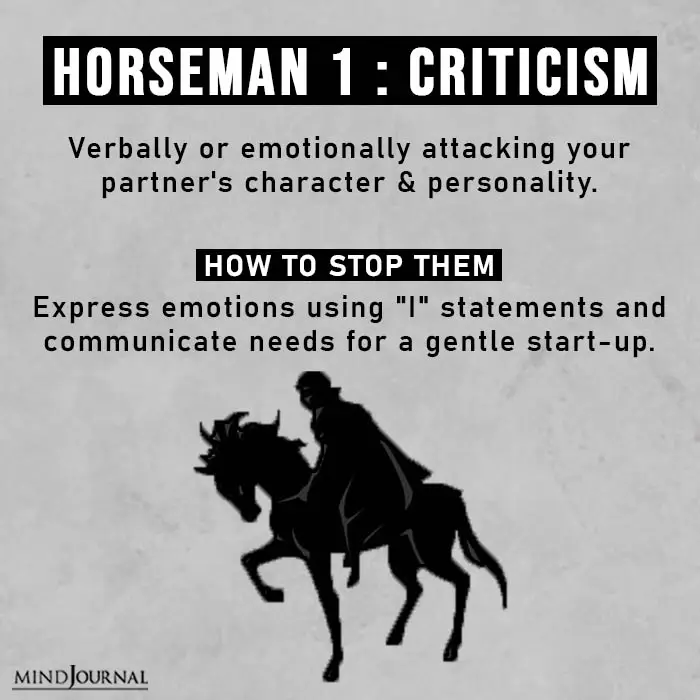
Criticism is one of the most common negative behaviors observed in relationships. This negative communication pattern can often stem from our own disappointments, insecurities and anger which we pass on to our partner by highlighting their mistakes, faults and limitations. It is a destructive psychological habit that attacks the other person’s character and personality, instead of simply focusing on the particular behavior that is unacceptable for the individual. Disagreements are a natural part of relationships, but there is a difference between criticizing them and complaining about their behavior. “Criticism is an attack on a partner’s character and is differentiated from mere complaints about behavior,” explains the 2019 study.
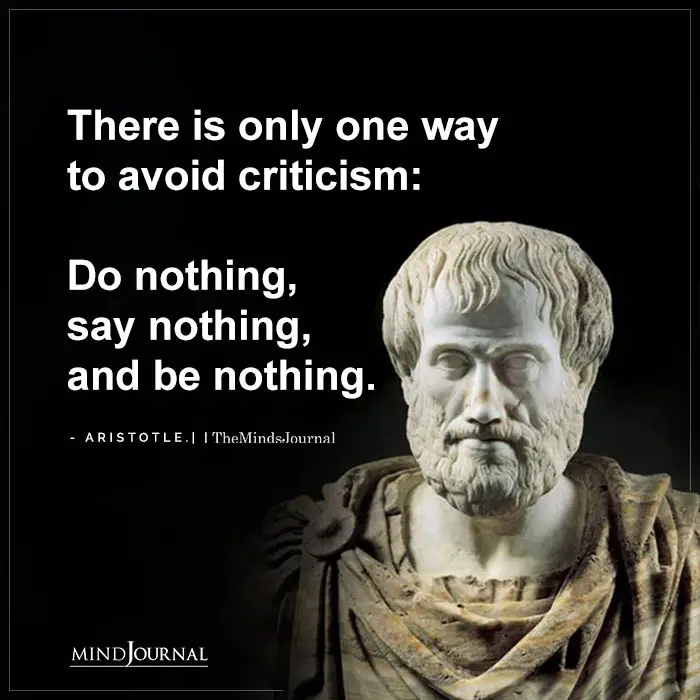
For instance, complaining may sound like “I am disappointed you didn’t buy the groceries even after saying you would.” However, criticism may be more harsh and aggressive, such as “I knew you wouldn’t buy the groceries because you are irresponsible and useless.” Criticism is verbally and emotionally attacking your partner which can affect their self-identity and self-esteem. This can be a highly toxic behavior as it can affect the victim’s psychological and emotional state leading to feelings of being rejected, assaulted, abused, and hurt. It can even lead to a pattern of criticism in the relationship where such negative behavior is repeated with higher intensity and frequency. One 2017 study found that criticism from a partner in romantic relationships can lead to social anxiety and sadness, especially among women. {3}
Read: 6 Ways To Protect Yourself From Destructive Criticism
2. Contempt
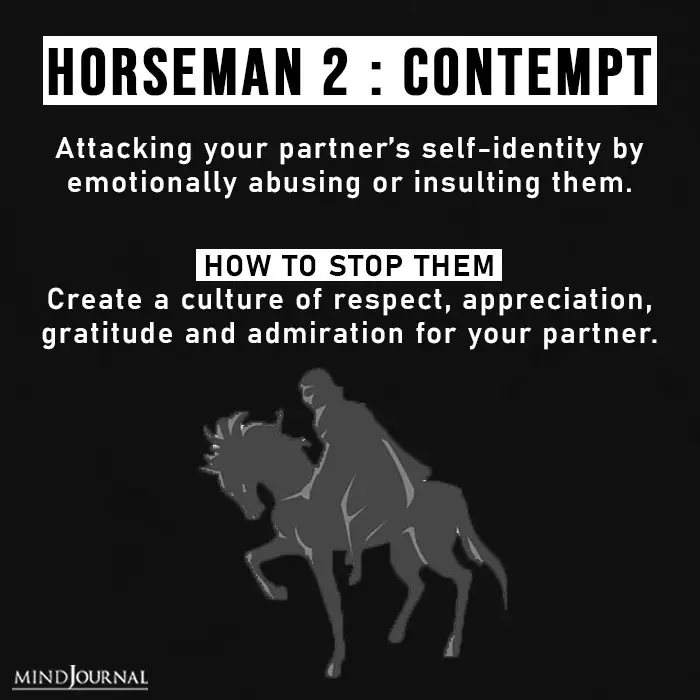
Contempt is the second horseman in Gottman’s four Horsemen model. Contempt refers to disrespectful behavior, such as name-calling, mocking, sarcastic jokes, ridicule, mimicking, and specific body language like eye-rolling. It is a very harmful communication pattern that looks down on the other person. This form of communication can make the other person feel insignificant and despised. In fact, contempt can be worse than criticism as it openly insults your partner. Where criticism can be seen as an attack on a person’s abilities and character, contempt puts the abuser on a pedestal of moral superiority over their victim. It attacks the other person, verbally or nonverbally, and adversely affects their self-identity by emotionally abusing or insulting them. It may put you on higher ground in the relationship, but it’s a sign of blatant disrespect for your spouse or partner. “Contempt goes far beyond criticism. While criticism attacks your partner’s character, contempt assumes a position of moral superiority over them,” explains The Gottman Institute.
According to a 2017 study, “Contempt is a powerful emotion.” {4} Research also shows that prolonged contempt is closely associated with breakup-related distress. {5} It has also been observed that contempt is linked with intimate partner violence (IPV). One 2019 study found that distressed communication, such as anger or contempt, served as some of the most common self-reported motivations for intimate partner violence among both male and female perpetrators. The study adds “We found that negative communication in the form of contempt was not only associated with one’s own physical assault perpetration but it was also associated with physical assault perpetration of the other partner.” {6}
Contempt can force you to overlook your partner’s positive qualities and even make you doubt their worth in your life. It is perhaps the most destructive horseman in the model. It was considered as the “sulfuric acid for love” by Dr. Gottman. Contempt shows that you believe “I am superior to you in every single way and you are nothing in front of me.” It can be poisonous for any romantic relationship as contempt exhibits characterological, moral & ethical superiority and disgust.
Read: What Is Emotional Abuse? How To Know if You Are Being Abused
3. Defensiveness
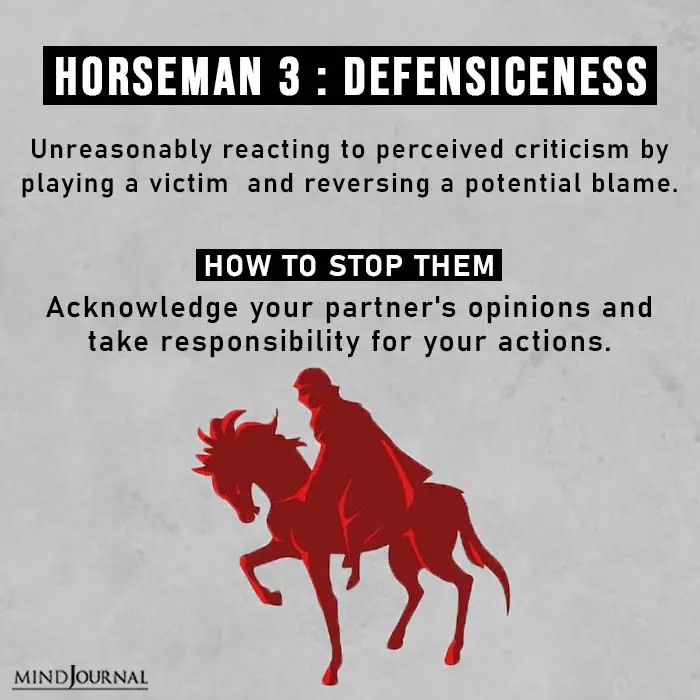
Another problematic horseman in Gottman’s Four Horsemen of the Apocalypse model is defensiveness. It allows us to protect our sense of self and self-esteem by playing a victim and dismantling potential blame or attack. Most of us tend to become defensive when we are attacked or criticized, however, it is mostly perceived as blame by the other person. It empowers us to defuse an accusation or censure against us. We often tend to be naturally defensive when arguing with our partners, especially when we are in long-term relationships. However, this is a toxic trait that can lead to dissolution. In this state of mind, we seek and present justifications, rationalizations, and even excuses when we feel attacked and try to put the blame on the other person. However, it is an unjustifiable reaction to criticism that prevents us from accepting our own mistakes and taking responsibility for our actions.
Sadly, this communication pattern is more harmful for the relationship and is never effective in protecting your self-esteem. It can even make the argument worse in case the other partner becomes defensive as well. “Defensive denial may be a salient type of maladaptive communication that erodes relationship stability over time,” as it can result in more toxic and destructive conflict-escalating behaviors, explains a 2013 study. {7} Research also shows that both men and women are likely to become defensive in relationships. {8}
4. Stonewalling
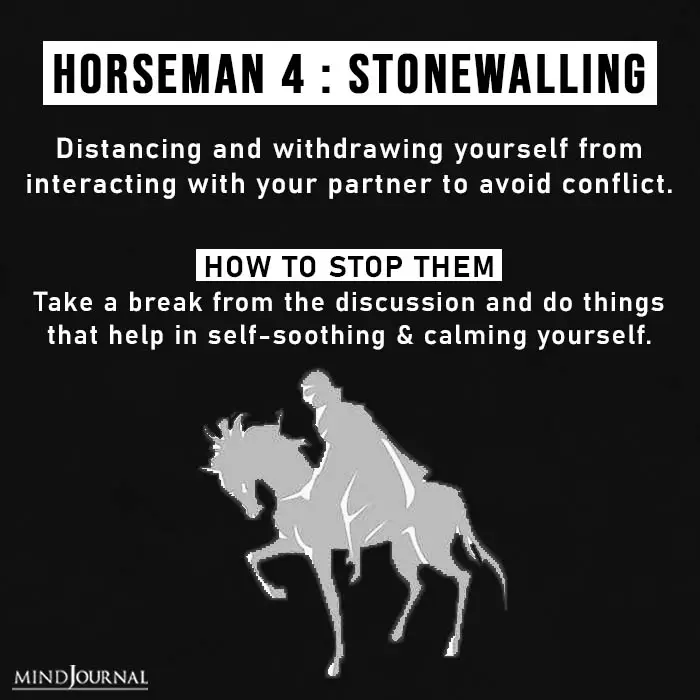
Stonewalling, the final element in Gottman’s Four Horsemen of the Apocalypse model, refers to the act of distancing and withdrawing yourself from interacting with your partner. It is a metaphorical wall that you create as an emotional avoidance strategy. You may act busy, become non-responsiveness to their attempts to communicate, avoid eye contact, give monosyllabic answers, or engage in emotionally & physically distracting behaviors in the relationship. The “silent treatment” is perhaps one of the most common examples of stonewalling. This horseman mostly appears after the initial three apocalyptic horsemen team up and become powerful. This behavior is truly toxic for a relationship as it can make the other person feel rejected and abandoned.
Stonewalling can be used by both the abuser and the victim. It is primarily used as a reaction to contempt and can make the person withdraw from the interaction. Instead of expressing their opinions or engaging in a healthy argument, the person uses stonewalling to engage in distracting behaviors. When the first three horsemen in Gottman’s theory become too difficult to cope with for one partner, they may resort to this strategy in order to protect their own self-esteem and mental state.
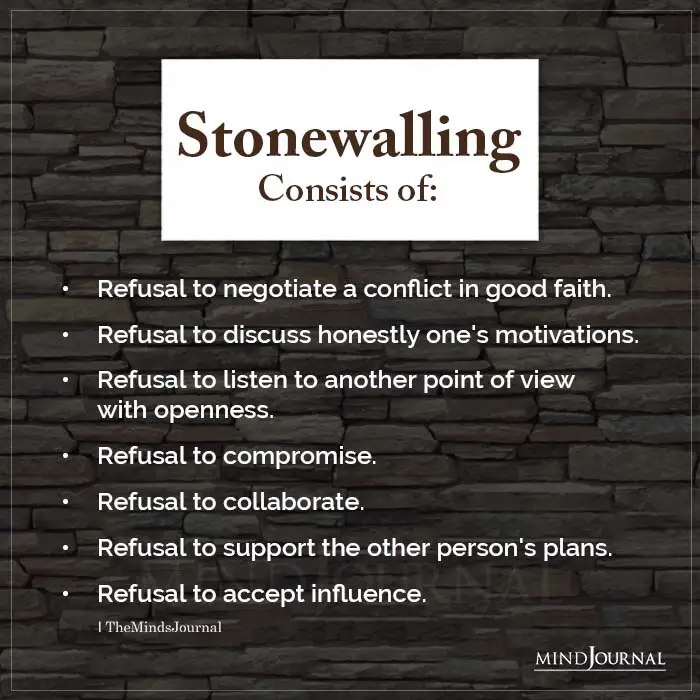
According to a 2013 study, stonewalling may be a strategy to regain emotional control. {9} It states that when one partner becomes critical, unresponsive, rejecting, or emotionally unavailable, the other partner can use certain emotional regulation strategies, such as stonewalling or withdrawing, which “unintentionally perpetuate or even exacerbate relationship distress and weaken the attachment bond.” Although it can help you calm down and manage your emotions in the moment, this technique for coping with relationship issues can make things worse. It prevents you from expressing your thoughts and emotions and makes the other person feel ignored and disappointed. It can make you feel highly frustrated and infuriated when you try to communicate with someone using this strategy in the relationship over a period of time. According to one 2009 study, stonewalling can lead to ‘Volatile-Avoidant’ mismatch in conflict styles in relationship outcome variables. {10}
Read: Why Narcissists Use Stonewalling As a Nasty and Powerful Defence Mechanism
Gottman’s Four Horsemen & Divorce
The unfortunate truth is we take care of our things better than our relationships. Most people in long-term relationships tend to take their partners for granted and this is where the four horsemen of relationship apocalypse start to rear their ugly heads. According to research, it was observed that Gottman’s Four Horsemen model can predict relationship failure or divorce with 93% accuracy. {11} Another 2016 study found that the quality of communication among partners can strongly affect their perception of relationship satisfaction. The study adds that communication plays a fundamental role in different models of relationship dissolution or deterioration, “as intimate bonds are believed to remain strong to the extent that partners respond with sensitivity to one another.” {12} However, it should be remembered that Gottman’s model is not focused on conflicts in relationships, but how we engage in conflict and deal with it. The four horsemen are destructive behaviors that can have a strong negative impact on any relationship.
According to John Gottman, Ph.D., the probable result or consequence of a conversation can be predicted with an accuracy of about 96% of the time depending on the initial 3 minutes of the interaction. Moreover, the Four Horsemen can bring an apocalyptic end to your relationship. Gottman explains that when specific types of toxic behavior are allowed to dominate a relationship, they can become extremely “lethal”. These are identified as the Four Horsemen of the Apocalypse. However, cross-validation analyses may be necessary to determine the accuracy of such models in predicting a romantic couples’ eventual divorce, suggests another 2001 study. {13}
Read: Common Relationship Communication Pitfalls and How to Avoid Them
Dealing With Gottman’s Four Horsemen
Conflict is a natural part of every relationship. Sometimes it can be healthy and help to strengthen, however, it can also be really toxic for some couples in unhealthy relationships. Gottman found that the success or failure of relationships depends more on how we deal with conflict, instead of the conflict itself. The focus here is on managing the conflict instead of resolving it, as conflict can have positive and functional outcomes leading to understanding, adjustment, and growth. By learning to manage how we communicate and engage in conflict, we can change the direction of our relationships and get closer to our partners. Partners should learn to “adjust their communication to the contextual demands they are facing in order to turn conflict into a catalyst,” for creating a happy and healthy relationship, suggests a 2017 study. {14}
This is why learning to identify and cope with Gottman’s Four Horsemen of the Apocalypse during conflict is important. Here are some strategies to counteract the horsemen in your relationship:
1. Coping with criticism
In case you or your partner are being critical of one another, it does not necessarily mean that your relationship is heading for the end. An effective way to deal with criticism in relationships is to share your complaints about what’s bothering you without pointing fingers or blaming your partner. Focus on the specific issue that is affecting you and what you want your partner to do about it. When you complain without blaming, you can start a healthy conflict and discussion that is not disrespectful towards the other person. Learn to use more “I” statements instead of saying “you”. Talk about your problems and feelings in a positive way instead of blaming your partner.
The focus here should be on establishing how you feel and what you need instead of what mistakes your partner may or may not have made. This can be followed by respectfully asking your partner to help you fulfill your needs. This can enable you to build a gentle and soft start-up.
Read: Transforming Criticism into Wishes: A Recipe for Successful Conflict
2. Coping with contempt
Respect, admiration, and appreciation for your partner are the best antidote to the second horseman from Gottman’s Four Horsemen model. Although you may not be able to accept or like some of the behaviors at times, focus on their positive and caring intentions and appreciate them. This can help to diffuse your negative outlook and stance and make the conflict healthier. By showing respect and admiration you can avoid wrongfully putting yourself in a self-established morally superior position. The key is to create a culture of respect, love, and appreciation in the relationship which will encourage both partners to behave in a healthy way in the long run.
By practicing and expressing affection, appreciation, respect, and gratitude for your romantic partner, you will be able to build a positive vibe in your relationship which can help to cushion negative emotions. The more positive energy is present in your relationship, the less contempt will be expressed or experienced by either partner.
3. Coping with defensiveness
Being responsible for your actions is the best way to weaken defensiveness. It allows you to put your guards down, acknowledge your partner’s opinions & perspectives and communicate better to reach a resolution instead of closing yourself down. When you stop being defensive, you stop blaming the other person and start observing how you may have contributed to the problem. This enables you to identify your limitations and work on improving your weaknesses. Accepting your responsibility is a great way to understand your role in strengthening the relationship.
According to a 2018 study, “we are more likely to receive a defensive and hostile reaction when we do not communicate any type of perspective, regardless of whether we use I-language or you-language.” {15} However, the study adds that when we communicate using statements that focus on the perspectives of both partners’ and involve I-language or statements, then we can significantly reduce the likelihood of a defensive response.
4. Coping with stonewalling
For dealing with the final factor in Gottman’s Four Horsemen model, it is important to learn to identify when you are feeling overwhelmed and focus on self-healing. When either or both partners are getting emotionally overwhelmed by the conflict, a great way to cope is to take a break and spend some time apart. As you may not be able to respond to your partner in the best possible way right now, it will be wiser to continue the discussion when both of you are not emotionally charged and feeling calmer. During his research, Gottman found that when couples take a break from an overwhelming discussion, their heart rates improve. They tend to have a more rational, productive, and positive discussion once they restart the conversation. By avoiding the discussion at the moment, we begin to physiologically soothe ourselves in a subconscious way. way. Engaging in mental and emotional self-soothing is the best cure for stonewalling. Taking a break from the conflict-inducing conversation is the key to self-soothing.
Read: 8 Self Soothing Techniques to Reduce Stress
Instead of stonewalling when you feel emotionally flooded, walk away from the stressful situation and take a break. However, make sure to be respectful towards your partner by communicating that you are feeling overwhelmed. Assure them that once both of you’re ready, you will get back to the discussion. If you keep stonewalling your partner and repress your emotions, sooner or later it will explode making your relationship worse. So take a break and engage in activities that make you feel better, something that helps you soothe yourself, such as taking a walk outside, reading, listening to music, eating your favorite food, or exercising. However, make sure that you and your partner take a break for at least 20 minutes in order to calm down physiologically and psychologically. In fact, research shows that taking breaks “during mentally demanding tasks” can lead to more positivity and productivity simply by engaging in relaxing activities for at least 20 minutes. {16}
Believe In Love

Relationships can be complicated. But love never is. Although Gottman’s Four Horsemen can lead to resentment, insecurity, insensitivity and negativity in your relationship, have faith in yourself, your partner and the love you share with each other. Learning to identify and counteract criticism, defensiveness, contempt and stonewalling can help you steer away from the toxic, destructive patterns of communication and use more productive communication patterns to build a healthier relationship. So make sure to be cautious about these horsemen of relationship apocalypse and focus on the solutions instead to enjoy the love you have for your partner.
Read: 6 Ways To Improve Communication In A Relationship
Here is an interesting video that you may find helpful:
Reference: 1. https://www.ncbi.nlm.nih.gov/pmc/articles/PMC7363036/ 2. https://pubmed.ncbi.nlm.nih.gov/30486710/ 3. https://pubmed.ncbi.nlm.nih.gov/28577587/ 4. https://pubmed.ncbi.nlm.nih.gov/27281351/ 5. https://www.ncbi.nlm.nih.gov/pmc/articles/PMC5730062/ 6. https://pubmed.ncbi.nlm.nih.gov/27543300/ 7. https://pubmed.ncbi.nlm.nih.gov/24188085/ 8. https://pubmed.ncbi.nlm.nih.gov/12064033/ 9. https://www.ncbi.nlm.nih.gov/pmc/articles/PMC3835900/ 10.https://pubmed.ncbi.nlm.nih.gov/19930437/ 11.https://ift-malta.com/wp-content/uploads/2013/01/gottman-predictor-of-divorce.pdf 12.https://www.ncbi.nlm.nih.gov/pmc/articles/PMC4852543/ 13.https://www.ncbi.nlm.nih.gov/pmc/articles/PMC1622921/ 14.https://www.ncbi.nlm.nih.gov/pmc/articles/PMC5181851/ 15.https://www.ncbi.nlm.nih.gov/pmc/articles/PMC5961625/ 16.https://www.ncbi.nlm.nih.gov/pmc/articles/PMC6585675/
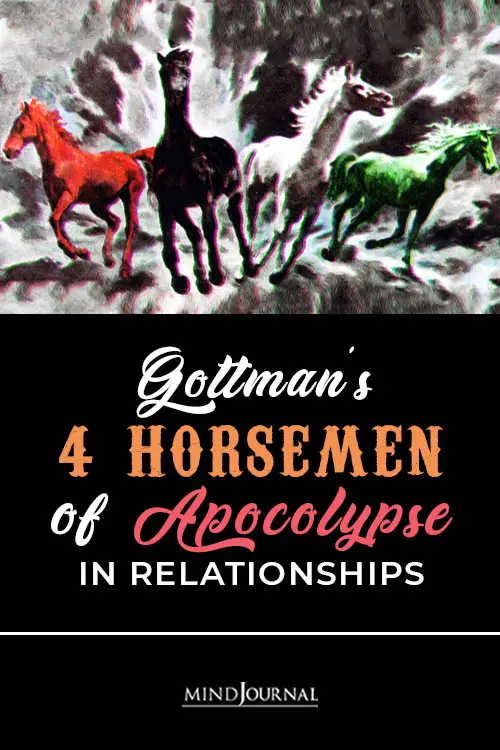
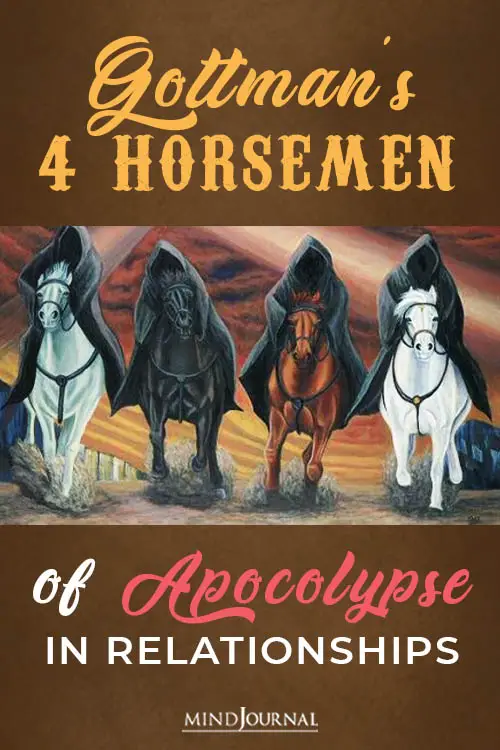
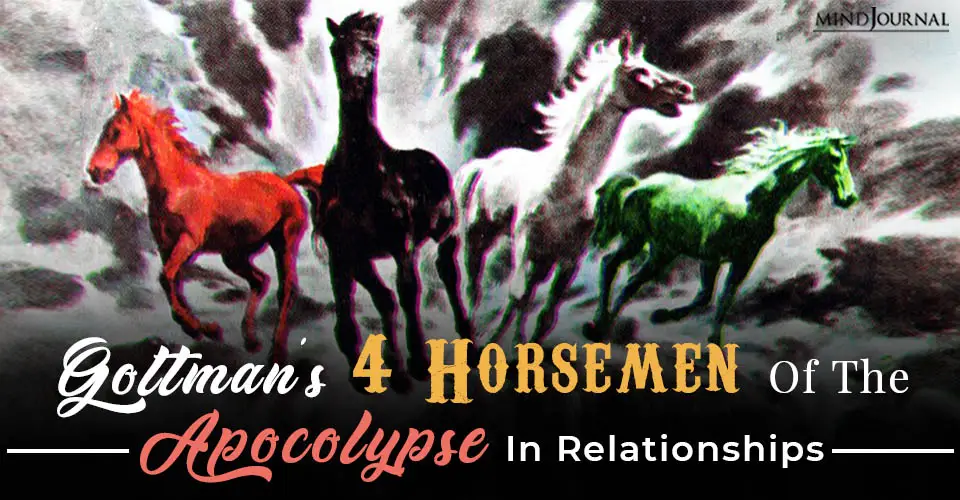



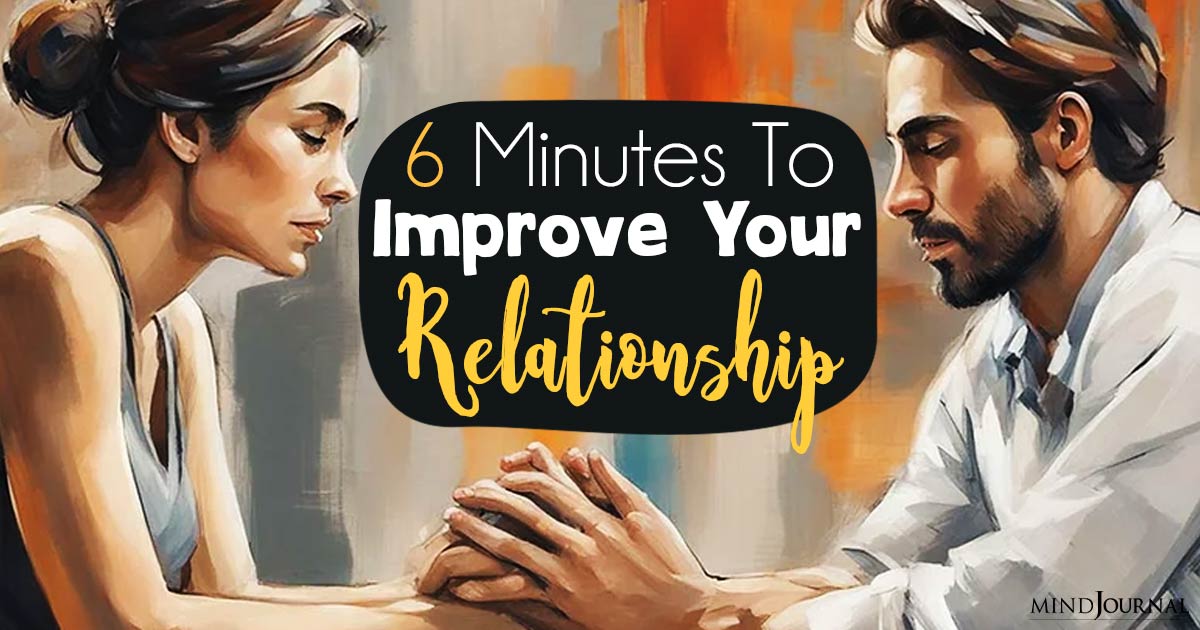
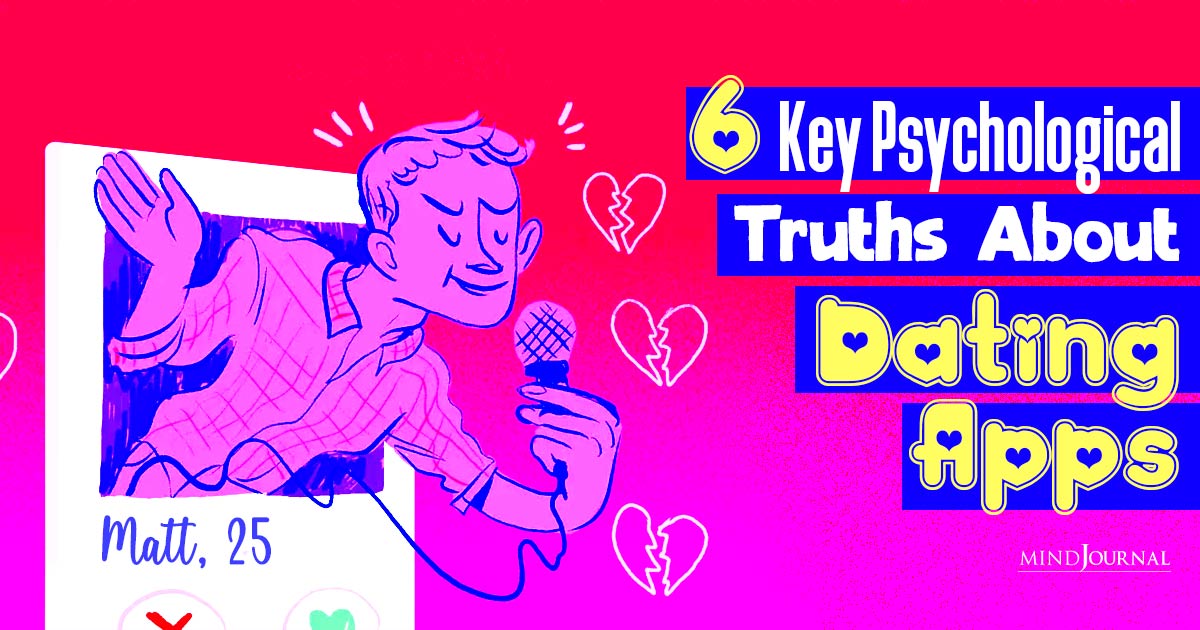
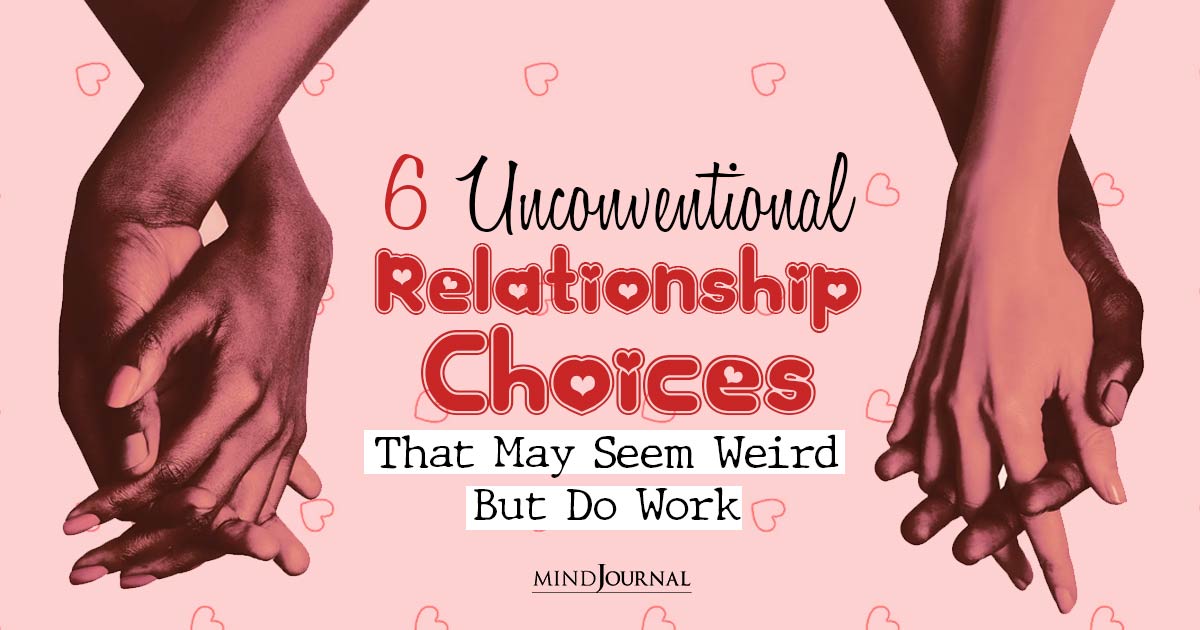
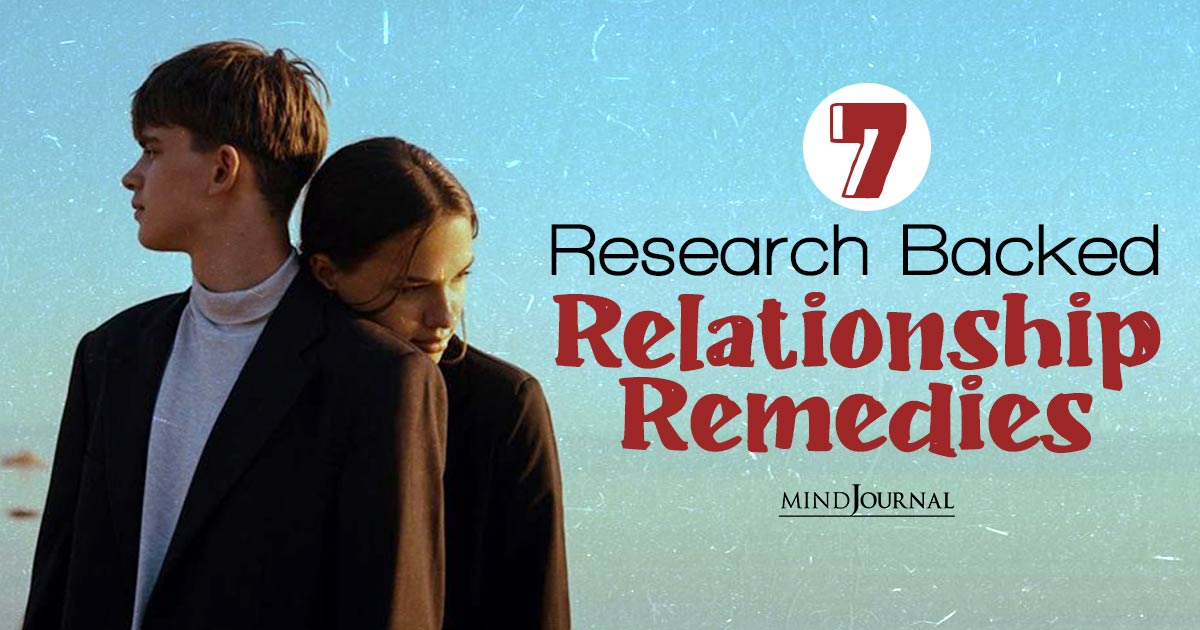
Leave a Reply
You must be logged in to post a comment.